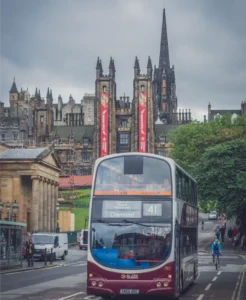Decarbonisation Minister Jesse Norman has announced applications are now open for organisations to host the new hub, with the government pledging £10 million in funding for the centre, which will establish a UK centre of excellence for transport innovation.
Currently, transport accounts for 27% of the UK’s emissions and the Net Zero Transport for a Resilient Future Hub will drive decarbonisation solutions, such as greater use of recycled materials and reducing the carbon footprint of repairs and maintenance.
The hub will also develop and implement innovative ideas to ensure future transport is resilient and meets the challenges of climate adaption, such as changes to weather and water levels.
It will focus on the UK’s transport sector’s needs over the next 25 years as the government works to meet its 2050 net zero goals, helping to ensure the sector can build UK skills, jobs and innovation.
Decarbonisation Minister Jesse Norman said: “Innovation is key to the growth of the transport sector, and the creation of high-skilled jobs and business opportunities across the UK.
“This new UK research hub will build a centre of excellence for the future development of low-carbon transport.”
By working to develop real-world solutions across a wide range of academic disciplines, such as architecture and design, computing and behavioural sciences, the hub will help support innovation in the UK which could lead to high-skilled jobs across the UK.
It will aim to provide a link for early-stage innovation and later stage demonstration across multiple transport modes to create, develop and test climate-resilient solutions that recognise how different places and types of transport will require different answers.
By researching the challenges of the transport sector in adapting to climate change and securing UK innovation, the centre will look to offer responsive, practical, evidence-based support to transport decision-makers and develop and implement sustainable, low-carbon solutions across existing and new infrastructure.
Some of the areas the hub will be expected to research include:
- solutions for resilient transport infrastructure – researching ways to improve the design of transport related infrastructure to better cope with potential climate impacts and reduce emissions, for example increasing use of recycled materials, increasing biodiversity in projects, or ways to use fewer materials
- streetscape – designing streets to minimise carbon emissions, improve drivers’ and pedestrians’ mental health and wellbeing, and ensure their resilience to potential climate impacts
- localised climate modelling of temperature, sea-level and weather – gaining a better understanding of potential climate impacts on specific areas, in part, to prioritise those places most in need for possible adaptive measures and projects
- bridge the gap between infrastructure research and policy – researching ways to shorten the time between developing innovative solutions and their wider adoption
UK Research and Innovation Building a Green Future lead, Professor Sir Duncan Wingham, said:
A partnership between the Department for Transport and UK Research and Innovation (UKRI), the Net Zero Transport Infrastructure for a Resilient Future Research Hub will lead the cross-UK research that is needed to effect transformational change in the transport sector.
It will lead future developments to decarbonise our transport sector, a crucial component of achieving the UK’s net zero 2050 target.
It will also help to ensure our transport systems remain resilient to hazards caused by extreme weather events and climactic changes that are already apparent.
The hub will be funded through UKRI’s Building a Green Future strategic theme to accelerate the UK’s transition to a secure and prosperous green economy by 2050. This theme is a partnership between government departments, industry and UKRI to fast-track the development of innovative solutions needed to meet the UK’s net zero goals, keeping the UK at the forefront of the green industrial revolution.
Over 80% of the funding for the hub will come from government through the Department for Transport, UKRI (via the Engineering and Physical Sciences Research Council), and organisations in the Transport Research and Innovation Board, with the remaining coming from the winning research centre, which will become the home of the hub.























